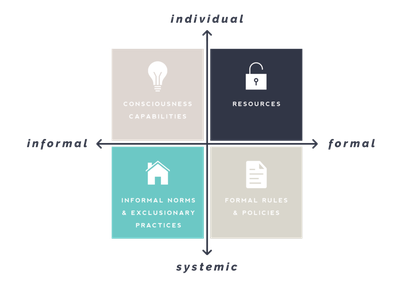
This blog was written by three of the students who joined the WageIndicator Gig team during their Internship Program. The internship also allows the interns to contribute to the news collection and create visuals to give an overview of different platform economy topics.
Authors: Jazz Abrahams, Nomalungelo Manana, Motjari Kukuri (The University of Namibia)
In recent years, the gig economy has emerged as a significant source of income and opportunity for women across Africa.
So-called 'empowerment' is something we hear a lot about when talking about women and the gig economy. But what does it really mean when applied to these contexts?
This blog explores the concept of empowerment by looking at the challenges and opportunities faced by women from some African countries in this sector, with a particular focus on Kenya and South Africa.
Reflections on the situation of women: Let's start with the context
Through webinars such as 'Women in Gig Work' on 27 October 2022 and 31 March 2023, which focused on the reasons why women pursue gig work and the benefits and challenges they face in doing so, particularly in South Africa and Kenya, WageIndicator has sought to shed light on the experiences and perspectives of women in gig work from some African countries.
Fairuz Mullagee, researcher and coordinator of the Social Law Project at UWC, South Africa, explained the exploitative nature of domestic work on platforms. While some platforms pay well, there is a gendered devaluation of domestic work such as cleaning. Two of the main challenges that women have faced so far are a lack of social protection, where they are marginalised with platform workers, and people not having enough gigs/jobs once they have signed up for gig work.
During 'Women in Gig Work: Web-Based Work', Grace Natabaalo, Research and Insights Manager at Caribou Digital, mentioned how women in Nigeria, Kenya, and Ghana face challenges such as sexual and verbal harassment simply because of their gender. Safety was cited as one of the reasons women seek to make a living on platforms, but their safety is still at risk as some gig jobs require their physical presence, such as Uber drivers.
Apart from that, both Grace Natabaalo and Fairuz Mullagee also discussed the reasons why women seek platform work. Access and job loss, especially post-COVID, are the driving forces for women seeking gig work, financial freedom, flexibility, and unfair pay from non-platform jobs.
Empowerment: Redefining Success
To better understand the concept of empowerment, we need to rely on models that include both individual and collective factors.
Professor Andrea Cornwall has introduced a comprehensive and accessible framework for the concept of empowerment, known as Gender at Work (Cornwall 2016; Gender at Work 2021).
The framework is a two-by-two form that classifies change as either institutional/systemic or individual and formal or informal. It suggests that all these factors play a crucial role in enabling or limiting empowerment. Power dynamics within communities confirm the relationship between gender equality, organisational change, and institutions or 'rules of the game'.

As explained on genderatwork.org, the top two quadrants relate to the individual. On the right are changes in tangible individual conditions (increased resources, voice, freedom from violence, access to health and education). On the left is individual awareness and capacity: knowledge, skills, and political awareness.
The bottom two clusters relate to the systemic. The cluster on the right refers to formal rules as laid down in constitutions, laws, and policies. The cluster on the left is the set of informal discriminatory norms and deep structures, including those that perpetuate inequality in everyday practices.
The framework implies that true empowerment of women goes beyond mere access to assets or the provision of enabling laws and policies. It involves overturning normative beliefs that confine women to dependency and subordination and challenging restrictive social norms and everyday institutions that perpetuate gender inequality.
Similarly, empowerment in the gig economy goes beyond mere economic independence. It encompasses the ability to exercise agency, make informed choices, and have control over one's life and work.
‘Platform Livelihoods Project’ — a collection of studies on digital marketplaces conducted in 2020-2022 by Caribou Digital and its research partners — applies the Gender at Work Framework to highlight the importance of providing women with access to resources, skills, and opportunities that enable them to thrive in the digital economy: “Ride-hailing is a useful illustration of the complexity of empowerment. It is not always a favorable alternative of earning (rough roads, traffic, not compatible with family/care work), women do not necessarily have agency, they may have to overcome social norms to drive, and neither does it present clear achievements given the challenges (as social commerce might)”.
Through this lens, empowerment becomes "a combination of consciousness and capabilities for women (and allies), resources, norms and practices, and formal rules and policies."
Moving Forward: Towards Inclusive Empowerment
To truly empower women in the gig economy, it is crucial to address the structural barriers and systemic inequalities that hinder their progress.
These barriers are multifaceted, including the gender digital divide, which is particularly pronounced in regions such as Sub-Saharan Africa. Limited access to digital tools and internet connectivity hinders women's participation in online gig work.
In addition, Kenyan women interviewed for the research The experience of women platform workers in Kenya (Digital Future Society) reported experiencing abuse, including harassment and non-payment of wages, which exacerbated their economic exclusion.
Social norms also pose a significant challenge, as strict gender roles in countries such as Kenya prioritise caregiving over paid employment for women. These societal pressures, coupled with older generations' perceptions that gig work is not legitimate employment, challenge women's autonomy and economic agency.
Furthermore, while platforms such as SweepSouth in South Africa offer opportunities for economic advancement, women still struggle to receive fair payment for their services. This perpetuates financial insecurity and undermines the potential benefits of gig work for women.
Gender bias and discrimination are also commonplace for Kenyan women working on freelance platforms: they are forced to deal with abusive clients and are reported to the platforms if they choose not to complete the job. Developing "thick skin" is the only thing to do.
Case Studies and Good Practices
Considering this, it is clear that providing these women with the skills and resources they need is a crucial starting point for their empowerment.
Access to training programmes, mentorship opportunities and financial literacy education can significantly improve their ability to navigate the digital marketplace. In addition, fostering a supportive community and network where women can share experiences, advice and opportunities is critical to creating an inclusive environment.
One outstanding example is the Ajira Digital Project and Youth Employment Program in Kenya. Designed to equip young people, particularly women, with digital skills, this initiative not only provides training but also connects participants to online work opportunities, enabling women to use their skills in the gig economy.
Similarly, the BMZ's digital learning platform atingi.org has found fertile ground and talent in Kenya. This is evidenced by its mentorship program for gig workers, which has trained 150 women with knowledge in online safety, fair wages and contracts.
Meanwhile, thanks to worker-owned platforms like We Care in South Africa, women can hope to regain control of their work, choosing pay levels, hours, and ideal algorithmic programming, while also receiving digital literacy training.
In a similar vein to We Care, the founders of Kenya's all-women ride-hailing app, An Nisa, have created an app where the algorithms are transparent and rides are allocated based on the driver's location and which driver is closest, rather than the number of hours a driver has worked.
Looking Ahead: the Policy Gap
Looking again at the framework for gender in the workplace, we can all see that it's the formal rules of the lower right quadrant that are most lacking.
Regulatory gaps are one of the main barriers for gig economy workers in African countries to seek accountability for rights violations, including for women.
Workers have gone on strike and launched class actions, waiting for governments to act. In some cases, governments have responded, but regulations are either still pending or focus on licensing rather than setting rules to ensure fair pay and better working conditions.
Platforms, for their part, are also being asked to put in place policies to support workers, with particular attention to the most vulnerable.
Restrictive social norms and gender issues play a major role in limiting women's growth and empowerment. However, legislative efforts and fair work policies could be an important step in demonstrating that their work is valued and recognised as contributing not only to individual empowerment but also to the economic growth of their communities.
